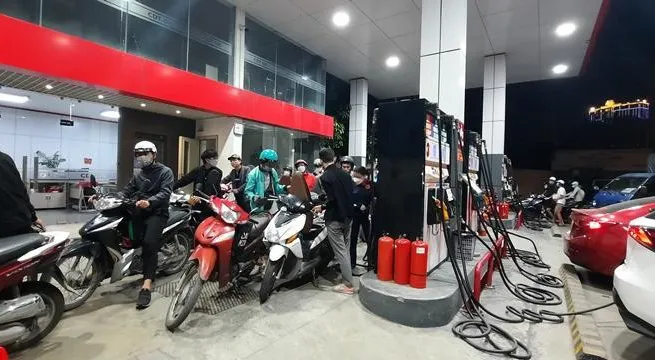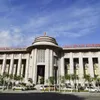Government will supply sufficient fuel for economy

Activities in the economy will not be affected as fuel will be provided sufficiently
It is expected that the National Assembly’s (NA) hall on October 27-28 will be heated by questions from the lawmakers on solutions to ensure the stability of the domestic fuel market, which remains unstable over the past weeks.
NA deputy Nguyen Thi Kim Be representing the southern province of Kien Giang said that in the last weeks, many fuel stations nationwide have been operating in moderation, with limited sales, making it difficult for enterprises and people to conduct business and traveling activities.
“Especially in the southern region, fuel shortages have become an oft-seen situation, irritating constituents, while a number of responsible ministries and agencies said that they ‘bear no responsibility for that’,” Be said.
In fact, fuel shortages have been seen in Ho Chi Minh City and a number of southern provinces, including Binh Duong, Dong Nai, Dong Thap, Kien Giang, and An Giang as of October 11, 2022. The shortages began in Ho Chi Minh City on October 6 after petrol provider COMECO ran out of fuel for sales due to scarcity and rising fuel prices.
As many as 121 stations in Ho Chi Minh City have reportedly run out of fuel. The same situation has also been seen in Hanoi, with many stations have either been selling fuel in moderation.
NA deputy Tran Anh Tuan, vice director of Ho Chi Minh City’s Department of Planning and Investment, ascribed the situation to the Ministry of Finance (MoF) and the Ministry of Industry and Trade (MoIT) that have yet to monitor the fuel market effectively, making fuel traders suffer from losses so they did not want to continue their business.
Meanwhile, deputy Tran Hoang Ngan representing Ho Chi Minh City also said that this situation must be radically solved by the government. “The NA needs to empower its Standing Committee to decide on all issues related to fuel,” Ngan suggested.
However, MoIT Minister Nguyen Hong Dien, while attending a NA group-based meeting a few days ago, explained that a number of fuel traders are also investing into property and securities. However, these sectors are facing difficulties, meaning a reduction in capital for them to import fuel.
“In the coming time, we will work with relevant agencies on an amendment to the existing decree on fuel trading,” Dien said. “However in the very short term, we will continue closely managing the domestic fuel market. All violations will be punished. Any traders with two times of violations will have their business licences revoked.”
He also noted, “Vietnam has never suffered from any shortage of fuel supplies. It has been widely said that the country is now facing this situation, but I can affirm that this information is quite incorrect as we have in our hands detailed data, assessments, and evidences.”
“We currently have market management authorities, with localities’ departments of industry and trade always examining the fuel situation in their areas. As of September 30, 2022, we had commercial reserves of 1.255 million cubic metres of petrol, and the capacity of Nghi Son and Binh Son oil refinery and petrochemical plants in October can ensure 80% of domestic fuel supplies, with 1.3 million cu.m a month,” Dien revealed. “As planned, 34 key traders had to import 500,000cu.m in October, meaning more than three million cu.m between late September and mid-October – fully meeting domestic demands until mid-November. Meanwhile, the country will continue production and import of more fuel.”
Prime Minister Pham Minh Chinh has also said that the government has assigned ministries and agencies to review all activities on fuel production, importation, and distribution, and authorities are creating all best conditions for producers and traders to perform in line with the law.
“The domestic market must not be disrupted by fuel shortages,” he stressed.
He has also ordered the MoIT to work with ministries and agencies to “closely watch the situations of indispensable items in the market, especially fuel, and find all ways to prevent any disruptions in fuel supplies, and sufficient fuel must be ensured for domestic production and consumption.”
The MoIT’s leadership has required its Department of Domestic Market to work with the MoF and relevant agencies to “closely follow the developments of the world’s fuel prices, and regulate the fuel prices within its power and in line with the law, while using measures to supply sufficient fuel for the economy in all situations, ensuring the benefits of the state, people, and businesses.”
PetroVietnam has reported that it will continue making efforts in ensuring fuel supplies for the local economy.
“A for the production plans of Nghi Son and Binh Son plants in H2 of this year, both plants are estimated to churn out 3.9 million cu.m in Q3 – occupying 72% of the market’s demand, and 4.4 million cu.m in Q4 – accounting for 80% of the market’s demand,” PetroVietnam said in a report sent to the MoIT. “Currently, the two plants are in full operation. The Binh Son plant is estimated to operate at a 105% capacity in H2 of 2022 so as to provide fuel for the domestic market,” PetroVietnam said.
The $9.3 billion Nghi Son plant in Thanh Hoa province is invested by PetroVietnam (25.1%), Kuwait Petroleum International (35.1%), and the Japanese firms Idemitsui Kosan (35.1%) and Mitsui Chemicals (4.7%).
Meanwhile, Binh Son Refining and Petrochemical JSC (BSR) is a subsidiary of PetroVietnam, and it is accountable for operating Dung Quat Oil Refinery in Quang Ngai province. This refinery is a national key project invested with more than 3 billion USD, and an annual processing capacity of 6.5 million tonnes of crude oil.
PetroVietnam also reported that its total revenue in the first nine months is estimated to be more than 587.14 trillion VND (25.52 billion USD), an on-year rise of 59%.
In the first nine months of this year, PetroVietnam’s export turnover is estimated to be over 2.17 billion USD, up 54% as compared to the corresponding period last year. In which crude oil exports reached 6.34 million tonnes - down 3%, and liquefied petroleum gas (LPG) exports touched 163,800 tonnes – down 19%.
PetroVietnam’s 9-month inventory also witnessed an on-year decrease, including LPG (79%), assorted fuel (48%), and polypropylene (50%).
According to the General Statistics Office, the domestic economy’s revenue from crude oil exports in September is estimated to sit at 304.35 million USD, lifting the 9-month figure to as much as 2.61 billion USD – doubling the annual estimates and up 103.5% on-year.
Nguyen Hoai Nam, deputy general secretary of the Vietnam Association of Seafood Exporters and Producers said that stability in fuel prices will help tens of thousands of fishery enterprises in Vietnam to stay afloat and improve competitiveness.
“In spite of some recent reductions of fuel prices, the fishery industry is still facing numerous difficulties including a hike in transportation costs and fuel prices, and this has been a big burden for businesses,” Nam said. “High fuel prices have been making it increasing difficult for ship owners. For example, each trip offshore to fish would need about 300 million VND (more than 13,000 USD) for a ship, and each time when the fuel price is raised, the ship’s operational costs will ascend by an average rate of about 20-30% because the ship will need many things such as fuel, ice to freeze fish, drinking water, and foodstuffs. What is more, the escalation in fuel prices have also led to a 15-20% increase in the transportation costs for automobiles within Vietnam.”





